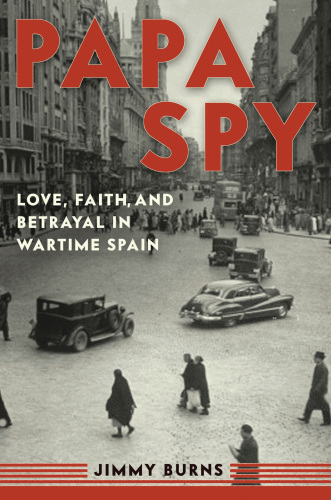
Papa Spy
Love, Faith, and Betrayal in Wartime Spain
کتاب های مرتبط
- اطلاعات
- نقد و بررسی
- دیدگاه کاربران
نقد و بررسی

November 1, 2009
Financial Times journalist Burns (Bar‡a: A People's Passion, 2000, etc.) examines his father's career as a British Secret Service agent in Spain during World War II.
The author learned a great deal about his father's wartime activities from the recent opening of MI6 files as well as tracking down the still-living participants, whose memory, he admits, proved shaky. The official version of his father's work—running Allied propaganda in the Iberian peninsula under Sir Samuel Hoare, then British ambassador to Spain—claimed that Burns had suspicious fascist, pro-Catholic leanings and elicited information from and protected sources who were suspected of being German agents. Burns fils sifts carefully through the record and concludes admiringly that his father's methods—going"native" in Spain and resisting the Minister of Information's attempts to control him—proved highly effective in the ultimate goal: to keep Franco and his pro-Axis minions from siding with Hitler. Born Catholic in Chile to British parents, papa Burns was educated by the Jesuits in England. He befriended a circle of Catholic intellectuals and worked at The Tablet, recruiting such literary lights as Hilaire Belloc, G.K. Chesterton and Graham Greene. The energized young Catholics were horrified by the communist"savagery" enacted on the Catholics with the outbreak of the Spanish Civil War, and Burns had to tread gingerly between Franco's suspicion of the British effort and the Nazis military and espionage offensive. Winning Spanish public opinion was first priority, though Burns's fraternization with Spanish collaborationists proved questionable. On the other hand, he may have kept the British embassy from being shut down completely. More memoir than history, the author's re-creation of his father's wartime activities exposes a hive of complex spy games and a fascinating, little-discussed part of WWII.
Good and evil blur in this descent into the shadowy, slippery realm of wartime espionage.
(COPYRIGHT (2009) KIRKUS REVIEWS/NIELSEN BUSINESS MEDIA, INC. ALL RIGHTS RESERVED.)

November 1, 2009
British journalist Burns's fascinating account of his father's diplomatic service in Madrid (194045) has multiple themes. The bulk of the book concerns Tom Burns's varied efforts, while officially stationed at the British embassy in Madrid, to counter Nazi influence in a geopolitically vital location. (He officially worked for the Ministry of Information, and his efforts included involvement with secret agents, information gathering, and propaganda.) Other topics include British intellectual and literary society, the Catholic publishing business, and discrimination against Catholics by the English establishment in Madrid. The senior Burns was even criticized for being an independent-minded Catholic maverick, marrying a member of the Spanish social elite, and supporting the fascist dictatorship more assiduously than was politically correct so soon after the bitter Spanish civil war, when the Allied goal was to keep Spain neutral and Gibraltar in British hands. In addition, Soviet spies in Whitehall also worked to remove Burns in order to damage Allied-Spanish relations. VERDICT Recommended reading for anyone interested in modern Spanish history, World War II diplomacy, espionage activities, and Communist penetration of the British intelligence bureaucracy. (Index and photos not seen.)Daniel K. Blewett, Coll. of DuPage Lib., Glen Ellyn, IL
Copyright 2009 Library Journal, LLC Used with permission.

January 1, 2010
The authors father served the British cause in World War II as a press attach' at the Madrid embassy, a role Burns fils researched for this book. Certain credentials commended Burns p're to the diplomatic post: a Catholic, he was a socially connected editor who supported the Nationalists in the Spanish civil war. As he looked into his fathers activities in Spain, Burns discovered two original sources: correspondence with a love interest, Ann Bowes-Lyon, a cousin of the queen, and an MI5 dossierthe counterintelligence service suspected him of being too pro-Franco and possibly a German agent. Integrated with extant histories, Burns new information depicts a historical setting of the kind of intrigue that tempts spy novelists such as Alan Furst. In the real secret war with the Nazis, Thomas Burns efforts apparently were not confined to propaganda and press relations. Recounting his fathers extracurricular work, the author levelly assesses their results without overrating their effect on Britains strategic aim of keeping Spain neutral. The audience for WWII espionage should warm to Burns tale.(Reprinted with permission of Booklist, copyright 2010, American Library Association.)

























دیدگاه کاربران